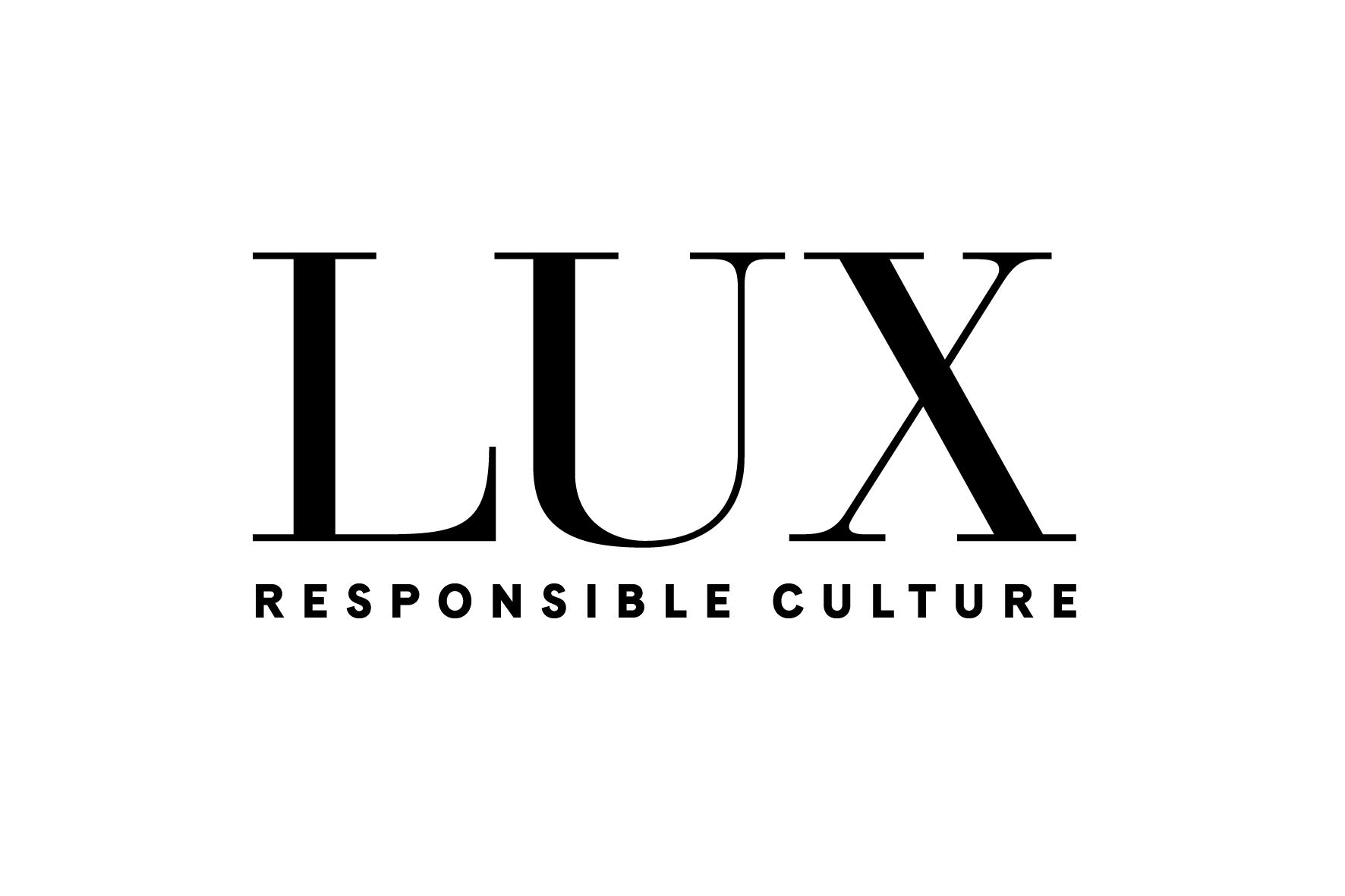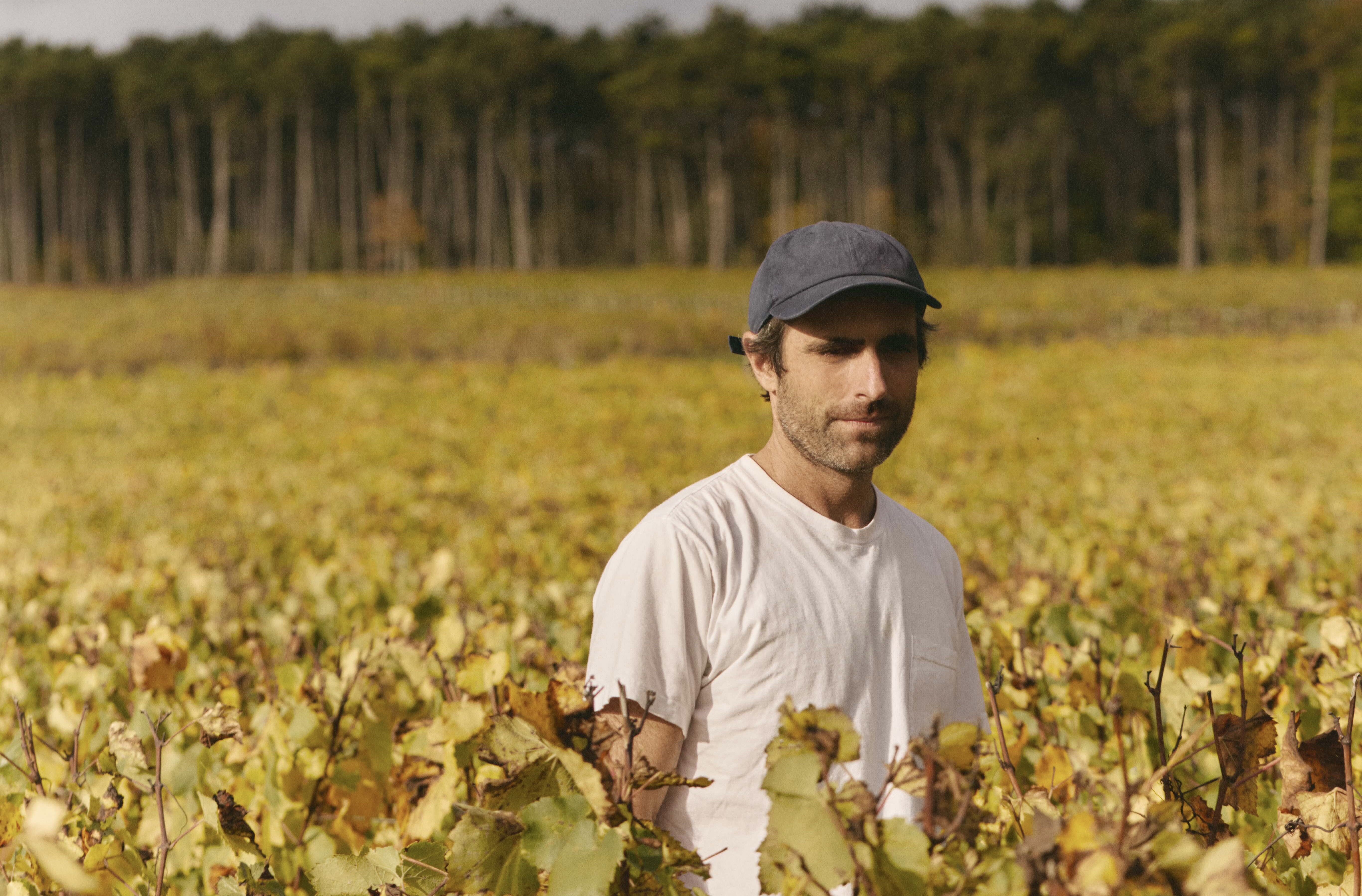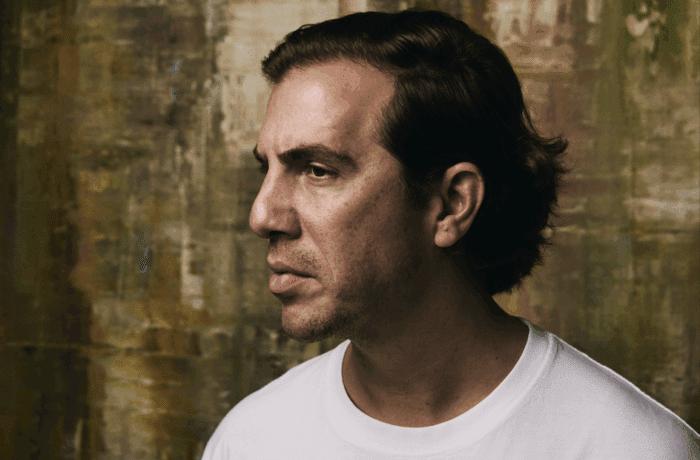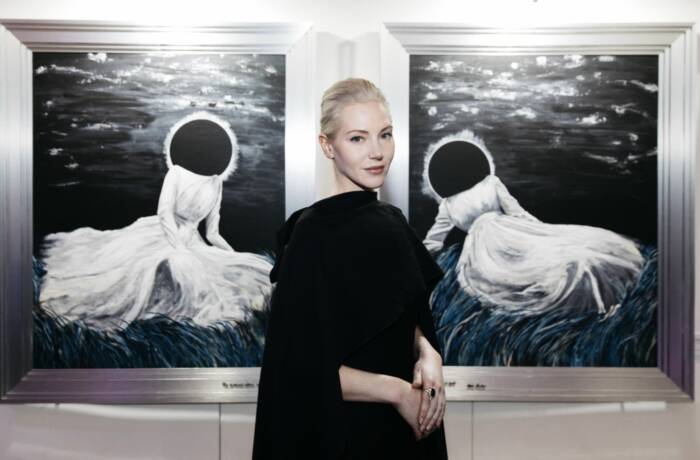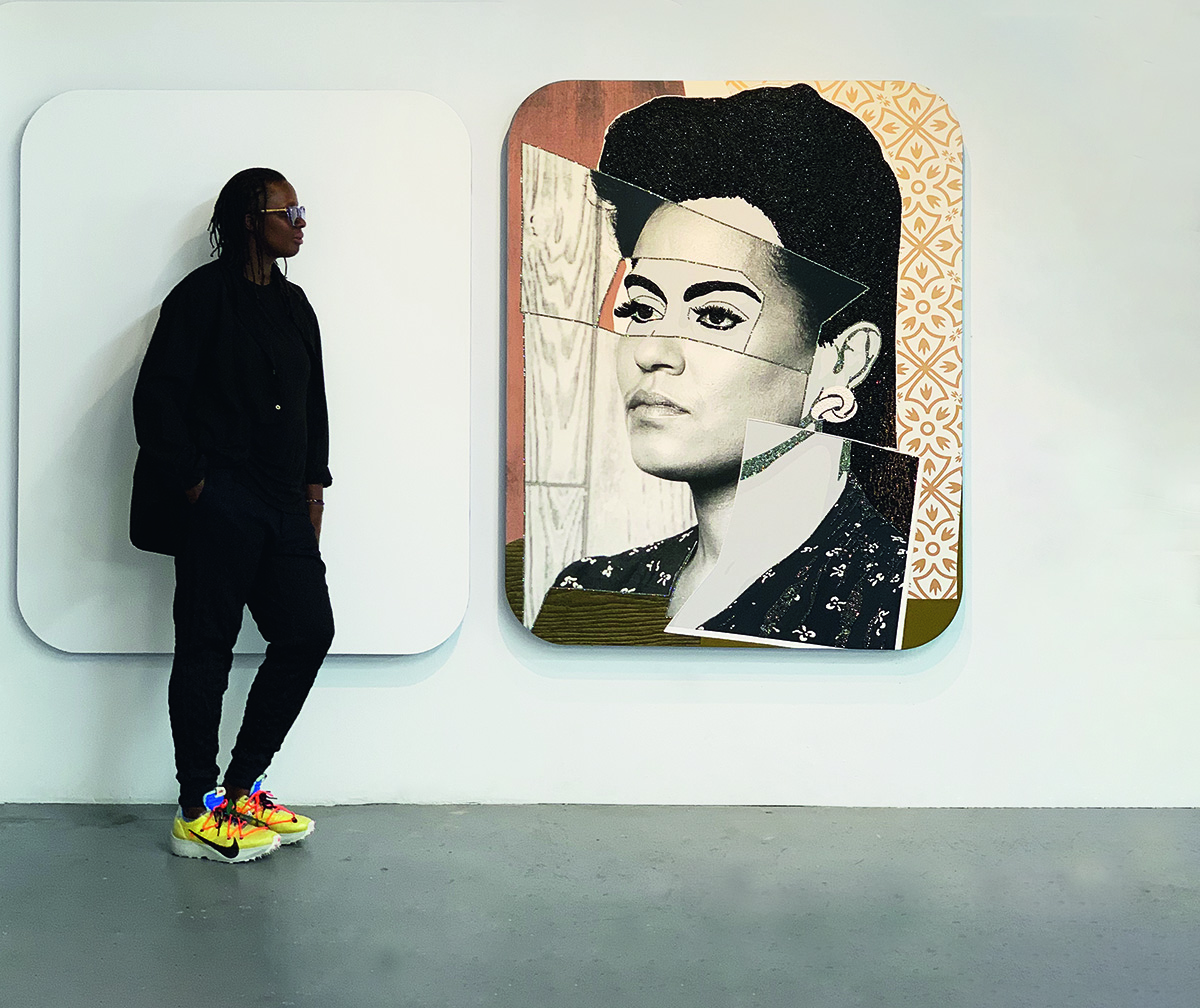
Mickalene Thomas with her work Clarivel #6 (2019). Photograph by Maryam Eisler
New York-based Mickalene Thomas is an important and innovative voice in the art world. Her dazzling portraits of African American women use collage, enamel and her signature rhinestones to explore femininity and ideas of beauty. Maryam Eisler visits her in her Manhattan studio to photograph her and talk beauty, sexual politics, identity and racial stereotyping
LUX: Your work is almost exclusively about women – real women, everyday women, in different sizes, with different stories, textures, colours. Tell us a bit about this.
Mickalene Thomas: I love everything about women and more – confident women, smart women, the I-don’t-give-a-sh*t women, with all shades of blackness. When I think of all the women in my life, I think of those who have mentored me, about those I’ve read about in books and their stories. I think about all the women who have trail-blazed and sojourned that I aspire to be, about all the women who I haven’t met yet and who protect me. When I think of blackness, I think of my grandmothers. I remember seeing one of them at 95 years old in her apartment sitting in her favourite chair, and the wrinkling, deep indigo colour of her skin, that blackness, the ageless glow in her eyes, and thinking about all of the history that she’s endured and the things unspoken, all those secrets. I think of her vulnerability, her beauty, her fragility, her strength.
Follow LUX on Instagram: luxthemagazine
LUX: There are many stereotypes of black women set by white patriarchal societies. Is there an expectation for you to fit within a white canon of beauty? Not that you have ever conformed to that way of thinking, of course!
Mickalene Thomas: Yeah, especially when you think of the ideology of a beauty that was put forth, setting a paradigm and an agency for everyone to follow. I’ve always tried to figure out how that happened and how it remained at the centre of our world. Because there were so many other powerful empires that had their own notions of beauty and aesthetics.
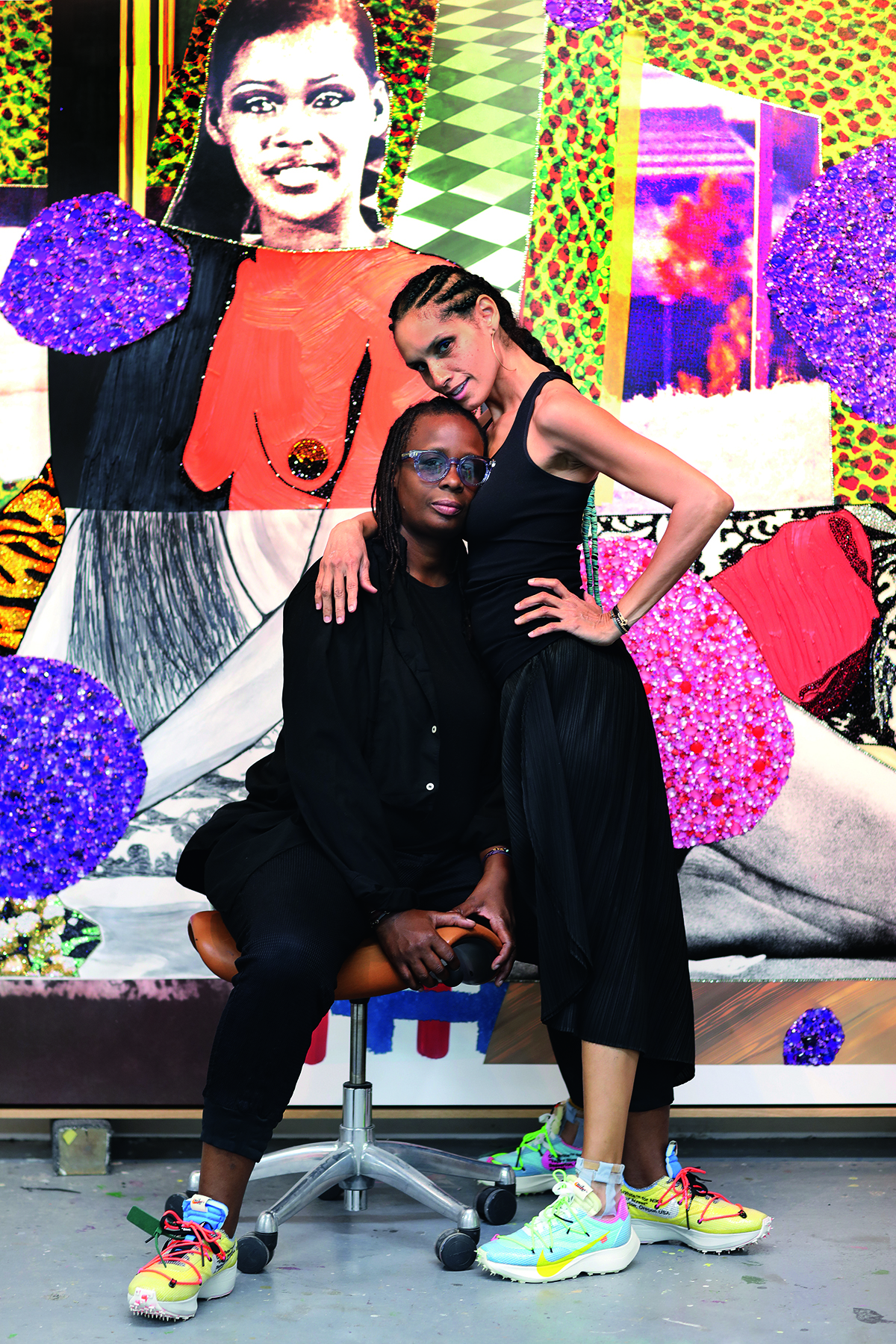
The artist with her partner Racquel Chevremont, in front of October 1975 (2019). Photograph by Maryam Eisler
LUX: How did you extricate yourself from this way of thinking about beauty?
Mickalene Thomas: As a woman of colour, I was fortunate to be raised by a very strong group of women. I never grew up wanting to be anything other than what I am, or wanting to question my own blackness. I never thought, “Am I light enough for you?” I’ve always had natural hair or locks. I’ve never straightened my hair. That’s never been an issue. So that white notion of beauty has never been imposed on me.
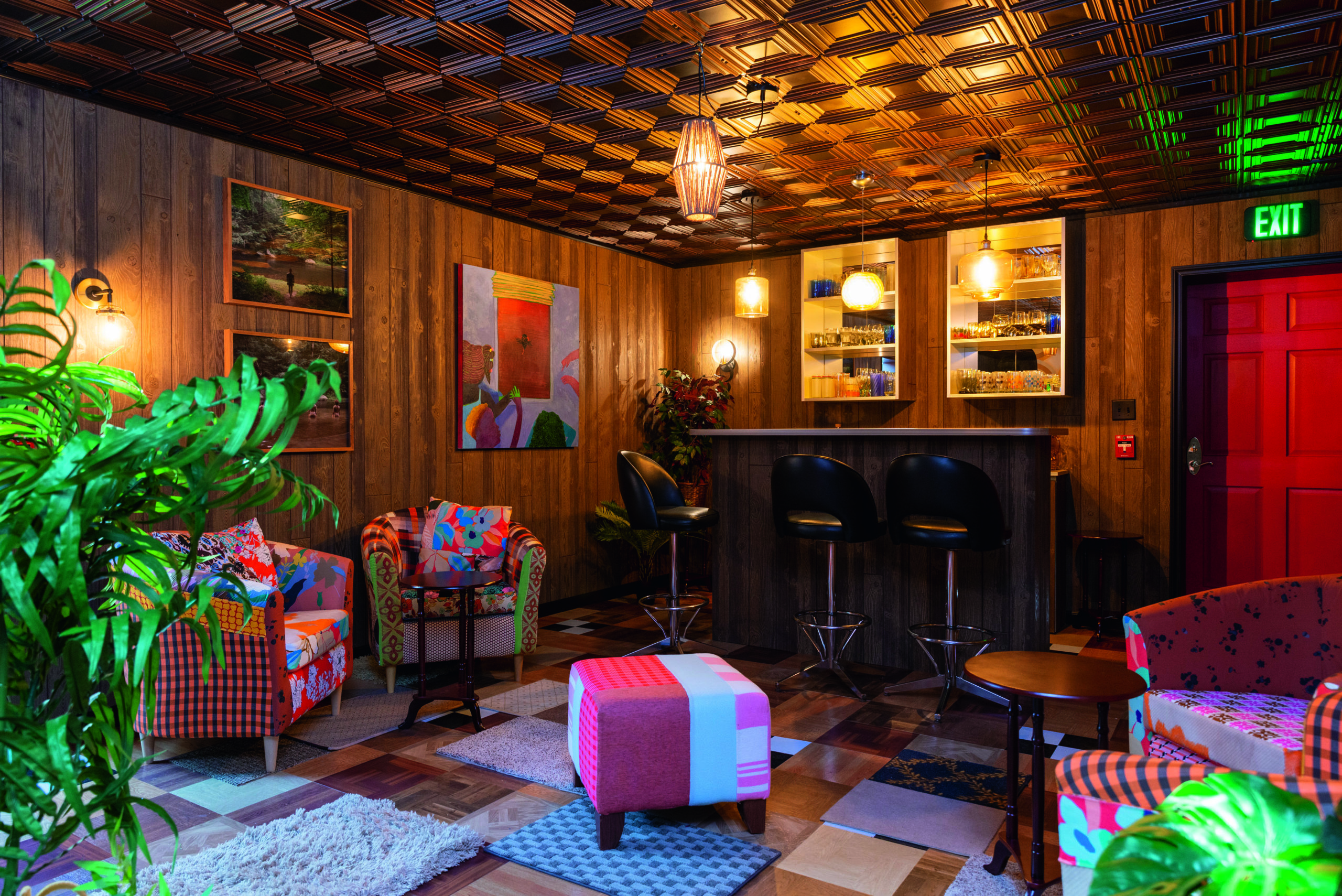
Installation view of ‘Mickalene Thomas: A Moment’s Pleasure’ at The Baltimore Museum of Art, 2019. © Mickalene Thomas. Photo Mitro Hood, BMA/The Baltimore Museum of Art.
LUX: Was this down to the influence of your mother and your grandmother?
Mickalene Thomas: Yes, they let me know that I was beautiful enough for myself and no one else, and that I’m of a new generation and can be a leader and that my blackness and difference is important. I questioned their ideas of beauty because they were vastly different from mine – but I also think that growing up with Black Power in the 70s made me think differently. Looking around the room and seeing women with hair in Afros was very empowering. It’s about freedom, really.
Read more: How Saudi Arabia’s Jeddah is establishing itself as a cultural hub
LUX: Yes. And owning it, right?
Mickalene Thomas: Yes, absolutely. However, you start questioning these ideas of beauty placed on you by the media because it’s the only representation that you see. You know that within your own community some things are considered beautiful, but then the media tells you otherwise.
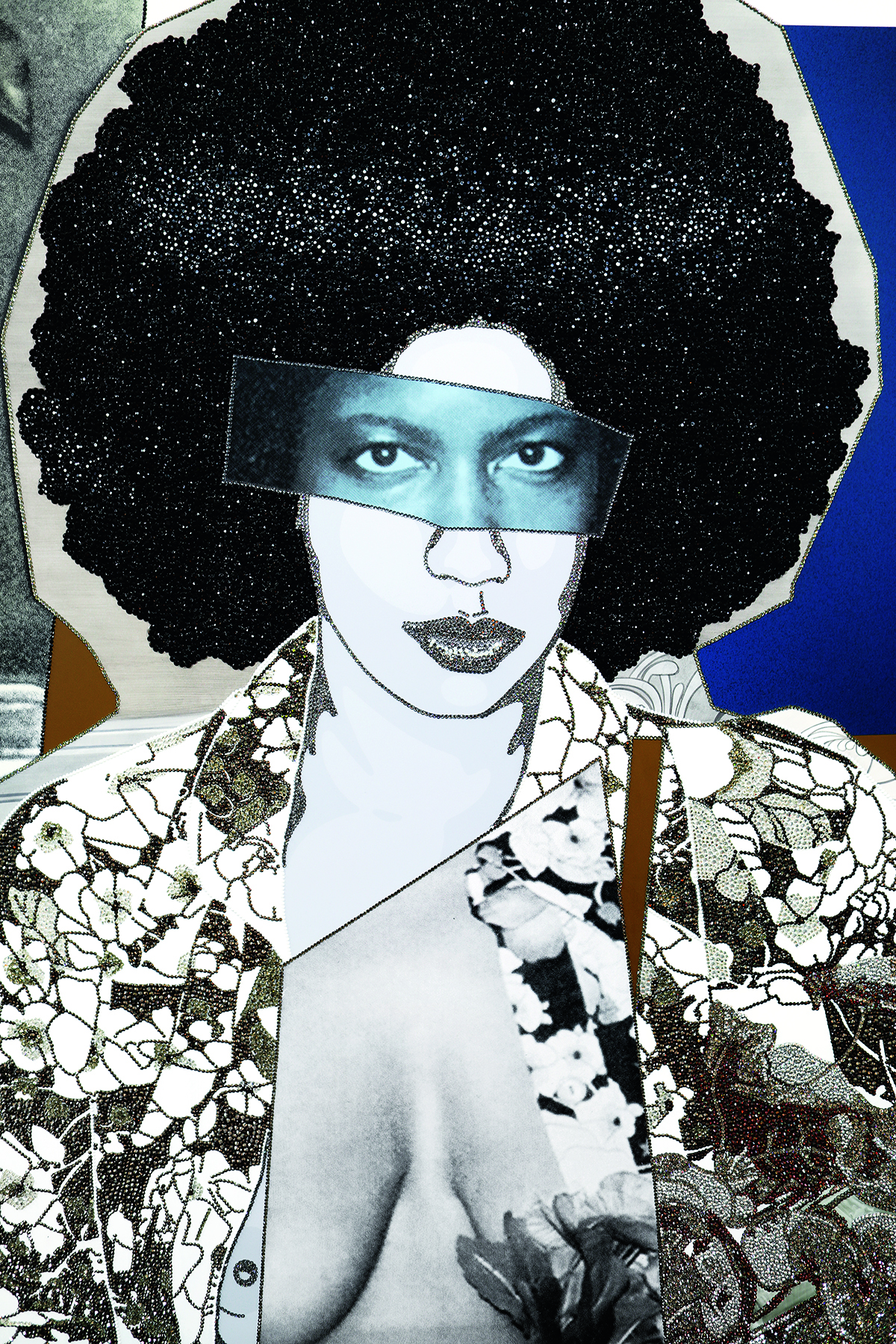
Untitled (Maya #4) (2019) by Mickalene Thomas. © Mickalene Thomas.
LUX: Does that make you wonder if you’re creating your own bubble?
Mickalene Thomas: Yes. And you’re constantly up against creating your own agency. Where do you fit in exactly? How do you navigate this world and this image consciousness as it is? Forget double consciousness!
LUX: With the histories and background stories involved, it’s probably more like a tenfold consciousness?
Mickalene Thomas: Yes! I think that if we embrace the diaspora and look at ourselves as the melting pot that we are as a people, then we can start tolerating our differences and embrace the various forms of beauty that each of us harbour.
Read more: Why we love Hublot’s limited edition spring timepieces
LUX: Do you think we tend to forget about our humanity as the common ground?
Mickalene Thomas: Yes, that would be a much healthier way of looking at the world – to try and understand the way we are because we had to migrate and move around for a variety of reasons, such as adverse conditions, weather, food, nature and much more!
LUX: What does it mean to question such stories of migration within your own community on a daily basis, in this day and age and in the USA of all places, the country of migration par excellence?
Mickalene Thomas: The entire country is based on migration. And for me, to even have to think about it gives me an ulcer. To think that America is leading this atrocity of deportation, when it is built on people immigrating here for many different freedoms.
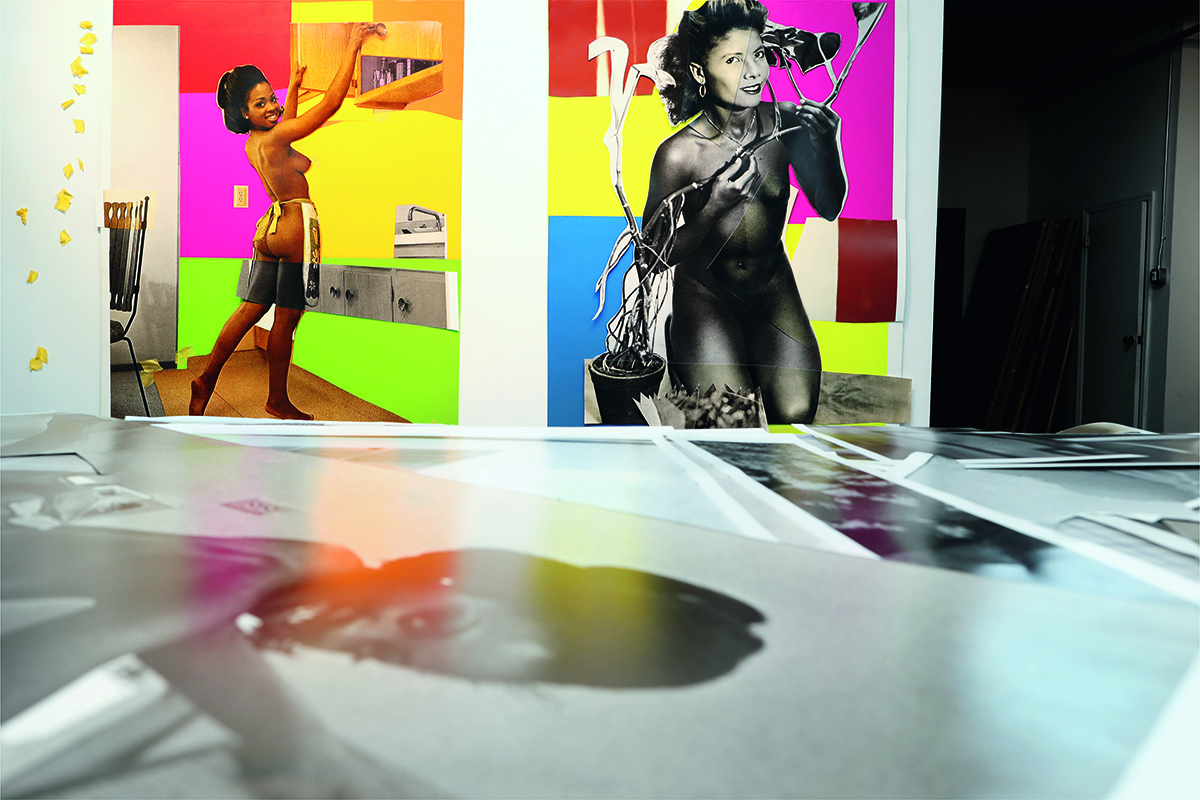
Studio shot of two works from Thomas’s 2019 series based on images from the Jet Magazine pin-up calendars from the 1970s. Image by Maryam Eisler
LUX: Where is this re-examination of colour, race, faith, culture coming from?
Mickalene Thomas: I think there are many people in the world who operate specifically out of hatred and fear. I was raised a Buddhist and I think that was one of the fortunate gifts my mother gave my brother and me, this sense of spirituality and the sense of philosophy of life. It’s not necessarily a religious practice, but more a philosophy of understanding, through knowing your causes and effects. The people who commit atrocities, such as mass shootings and bombings, are feeling displaced and threatened in society, and the causes are deeply rooted in their ancestors’ past. We want to live right now and right here, but there’s a lot we don’t look at in our pasts. I really believe that, as an artist, you have to look at history to move forward. We’re just moving forward without resolving our past histories. Times are tough. Our economy is about to take a huge shift, and I think it won’t just affect the poor or the middle classes – it’s going to affect many people in ways that they haven’t really seen before.
LUX: And there’s a lot of anger out there.
Mickalene Thomas: Yes. And people want something that they feel is owed to them, or that they are entitled to. And they think that immigrants and people of colour have been given some special privilege, not realising that most of us, if not all, have worked very hard to get to `where we are.

Installation view of the exhibition ‘Mickalene Thomas: Better Nights’, at the Bass Museum of Art, Miami Beach, 2019. Photo Jessica Klingelfuss, courtesy of Mickalene Thomas and Jessica Klingelfuss
LUX: Can we talk about ownership of one’s sexuality?
Mickalene Thomas: You’ve got to own it! You only have one life. Period. And it took me a long time to recognise my own power and strength.
LUX: And while it’s okay to flaunt it, it seems that women and men are judged differently when they do…
Mickalene Thomas: Men have much more access to self-expression as well as the freedom to navigate the world and go about doing whatever they want to do. I remember arguing with my brother and having to figure out how to deal with those complications and being very argumentative with my family about it: “So why is he able to do certain things and I can’t but that I do better?”
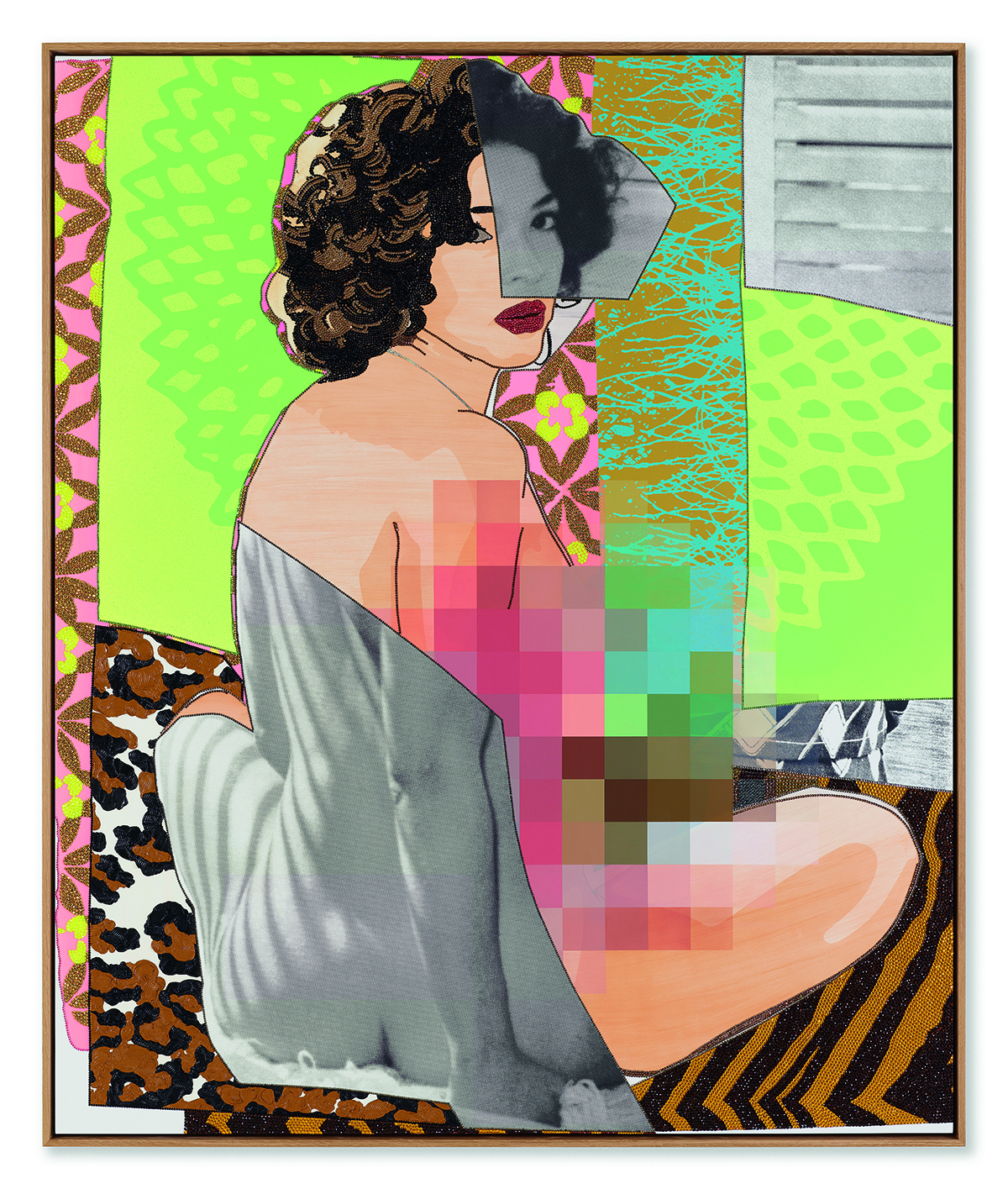
August 1977 (2019) by Mickalene Thomas. © ARS, NY and DACS, London 2020, photo Elisabeth Bernstein
LUX: Your work can be flamboyant, exuberant and cacophonous, with much layering and fragmentation. Is this a case of eye candy on the outside, but with deeper issues beneath?
Mickalene Thomas: These ways of telling stories, of thinking about how the women I depict collected their own histories, making sacrifices and compromises with little means and making the best of it. They went from one place to the other, transcending time and space.
Read more: Gaggenau presents new combi-steam ovens
LUX: So, it’s about stitching together a patchwork of life events?
Mickalene Thomas: A lot of the layering of material and patterning is about their own journeys, their own perseverance, their own struggles. The residue, the unearthing of time and space, is about their scars, and mostly it’s about the artifice of what you may think you see and the reality of it being another truth.
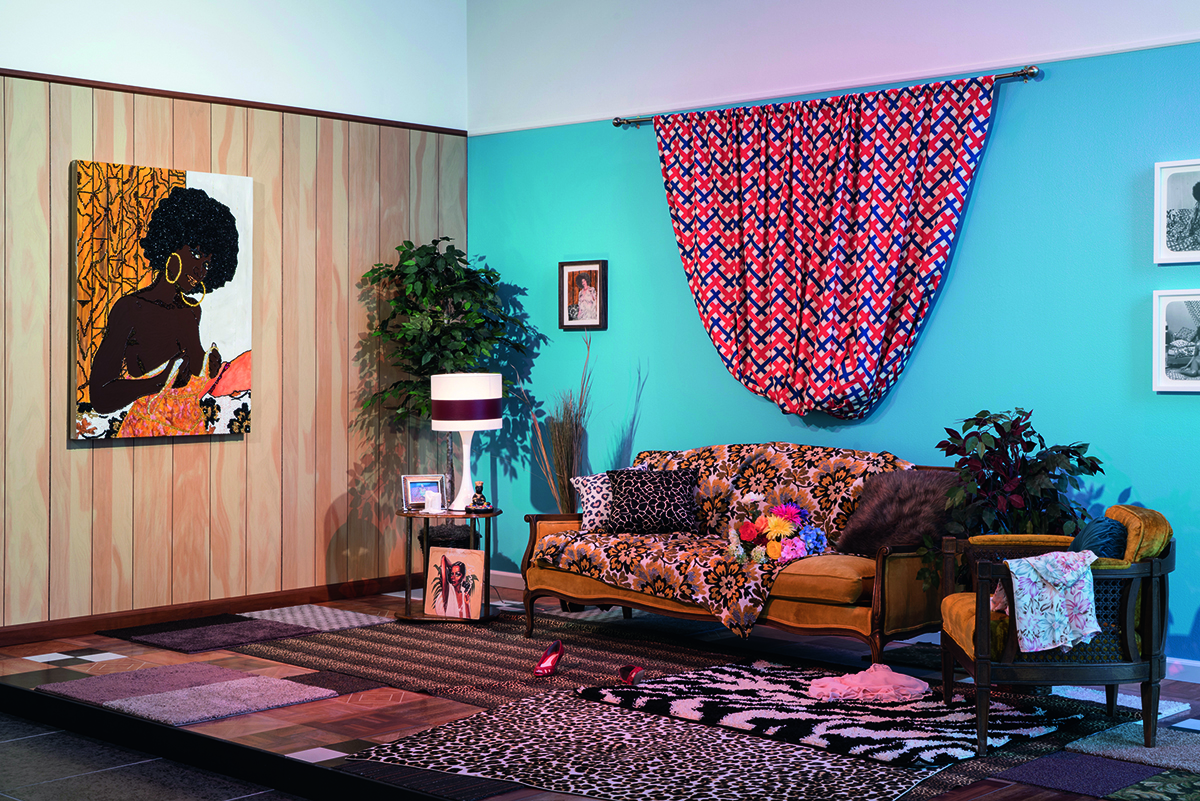
Installation view of ‘Mickalene Thomas: I Can’t See You Without Me’ at The Wexner Center for the Arts, Columbus, Ohio, 2018. Photo Luke Stettner, courtesy of Mickalene Thomas and The Wexner Center for the Arts.
LUX: The visual effect is powerful, and the nostalgia palpable.
Mickalene Thomas: There’s the power of the visuals, yes, and how we begin to believe our own truths or memories, whether or not there’s myth, and how they then become our reality. And so, as artists we create time capsules for histories. I find this very interesting, how people believe their own lies, their own truths, or their own memories or fantasies or dreams. These become reality to the point one might think: “Well, did that really happen?” When my mother passed in 2012, I came across photos that were almost a validation of my memory of childhood experiences. The photos encapsulated many moments for me – “Okay, now I have some evidence of what happened in my life. Now I have images from which to work. So now I have material to use for creative ideas and put the pieces of the puzzle together.”
LUX: So, above all, is your art a journey of research and self-discovery?
Mickalene Thomas: I think, as an artist, if you’re not doing self-discovery, then you’re really no longer making the art. It’s always a journey.
For more information visit: mickalenethomas.com
This article will also be published in the Summer 2020 Issue, hitting newsstands May 2020.
